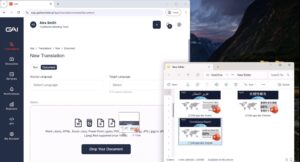The global energy sector is on the cusp of profound transformation in 2025-2030, driven by an accelerating energy transition, geopolitical volatility, and technological integration. This dynamic environment necessitates effective global operations, risk management, and robust communication, across diverse workforces and international partnerships. GAI Translate serves as a critical enabler, ensuring clarity, compliance, and safety through expert multilingual solutions for key operational, strategic, and regulatory documentation.
I. Global energy transition and market dynamics
The global energy landscape is undergoing an accelerating transformation, marked by a pronounced shift towards renewable energy sources.
For instance, global energy investment is projected to reach a record $3.3 trillion this year. Notably, $2.2 trillion of this capital is flowing into clean energy technologies, double the $1.1 trillion allocated to fossil fuels. This significant imbalance highlights a clear trajectory towards a ‘new Age of Electricity,’ with investments in generation, grids, and storage now approximately 50% higher than combined spending on oil, natural gas, and coal production. Solar power, including both utility-scale and rooftop installations, is set to be the largest single investment item in 2025, reaching an estimated $450 billion. However, current annual grid investment of $400 billion, is failing to keep pace with spending on generation and electrification, posing a concern for electricity security, particularly as new liquefied natural gas (LNG) facilities are on a strong upward trajectory, with the global LNG market anticipating its largest-ever capacity growth between 2026 and 2028.
Global events, evolving trade policies, and economic volatility exert significant influence over energy supply chains and market stability. Geopolitical disruptions are projected to cost global supply chains over $1 trillion in 2025, with significant impacts originating from critical regions such as the Red Sea, Eastern Europe, and the South China Sea. For instance, over 10% of global trade and 30% of container traffic pass through the Red Sea, risking disruption. Trade policies, including increasing carbon-related tariffs and efforts to reshore critical supply chains, are reshaping global trade dynamics, with the US actively working to expand tariffs and reshore critical supply chains and manufacturing production, while resource nationalism gains traction in emerging markets.
As global energy projects expand and international partnerships form, the accurate translation of investment proposals, market analyses, and cross-border agreements becomes critically important. GAI Translate ensures precision in complex financial and strategic communications, facilitating international collaboration and mitigating misunderstandings in a volatile global market.
II. Navigating regulatory complexity
The energy sector operates within an increasingly stringent and complex regulatory environment, with environmental regulations, safety standards, and ESG reporting requirements evolving rapidly across different jurisdictions. Notable trends include the emergence of carbon-related tariffs, such as the European Union’s Carbon Border Adjustment Mechanism (CBAM), which has already introduced operational complexities globally. In the United States, the Inflation Reduction Act (IRA) tax credits remain critical for energy investment decisions, despite existing political opposition due to the substantial existing investments. Furthermore, ESG standards face polarised perspectives, particularly across the US and Europe, with potential amendments to legal and regulatory frameworks on the horizon. The EU’s Corporate Sustainability Reporting Directive (CSRD) is activating in 2025, demanding significant effort in data collation and reporting from affected companies.
The evolving trends present a significant operational challenge: translating complex legal and technical compliance documents into actionable, understandable directives for a global workforce. This encompasses a wide array of documentation, including environmental permits, detailed safety manuals, comprehensive ESG reporting guidelines, and intricate contractual obligations. Any misinterpretation of these critical documents can lead to severe penalties, operational delays, and substantial reputational damage.
GAI Translate’s expertise in translating key policy files, regulatory updates, and compliance documentation ensures that leading energy companies can adhere meticulously to local and international laws, thereby avoiding penalties and reputational damage. Accurate, certified translations are vital for maintaining legal and operational integrity, especially with evolving decarbonisation mandates and the increasing risk of ESG litigation.
III. Technology, workforce, and operational safety
The energy sector is undergoing a disruptive digital transformation, leveraging advanced technologies such as Artificial Intelligence (AI), the Internet of Things (IoT), and Digital Twins to optimise operations across the entire value chain – from initial exploration to final distribution. Digital Twins, real-time virtual replicas of physical assets like wind turbines and power plants, are instrumental in enhancing operational efficiency: by facilitating live performance tracking and predictive diagnostics, these replicas reduce downtime and extend asset lifespans across different energy areas. AI and IoT devices enable system-wide monitoring, prognosis, and control with limited human intervention, fostering a “smart, networked, and autonomous industrial ecosystem”. This widespread adoption generates an unprecedented volume of real-time operational data, which, while crucial for optimisation, presents challenges in interpretation and communication across diverse global teams.
This calls for a highly skilled, adaptable, and safe workforce: the energy transition demands new and specialised skills, particularly in renewable energy technologies and modern grid management. This led to an industry-wide challenge in talent acquisition and retention of labour, with a surging demand for renewable energy professionals (e.g., high-voltage electrical engineers, grid connection specialists, HSE advisors) and a limited supply of qualified candidates – about 76% of energy employers report struggling to find qualified candidates.
Simultaneously, the transition also saw the need for robust Health, Safety, and Environment (HSE) protocols, especially with new technologies and geographically dispersed sites. Language barriers severely obstruct the clarity and efficacy of critical safety protocols, with regulations often mandating that safety training be provided in a language and vocabulary employees can readily understand. Relying solely on monolingual safety training can erode trust, reduce employee engagement, and increase turnover rates, as workers may hesitate to report hazards if they lack confidence in their understanding.
GAI Translate, in collaboration with Guildhawk’s video production services, provides multilingual safety videos worldwide to ensure that every worker, regardless of their native language, fully comprehends critical safety procedures, thereby significantly reducing incidents and fostering a robust safety culture. GAI Translate also facilitates the effective deployment of new technologies by localising confidential operational manuals, training materials, and software interfaces. This ensures accuracy and engagement, which are crucial attributes in high-stakes operational environments, and helps bridge the talent gap by making complex information accessible to a broader, multilingual workforce.
IV. Mitigating insured risks: GAI Translate’s role in enhancing resilience
In the high-stakes energy sector, effective communication is crucial to mitigating insured risks, which encompass potential liabilities related to life, property, and the environment. Communication failures, particularly across language barriers, can exacerbate these risks, leading to preventable injuries, environmental harm, and costly delays that often result in litigation.
GAI Translate directly addresses this by ensuring that critical information, such as safety protocols and emergency procedures, is transparently and quickly communicated in the language of every worker. This proactive approach prevents incidents, reduces the likelihood of environmental damage, and minimises the potential for legal disputes, thereby safeguarding human capital, physical assets, and the company’s reputation.
 GAI Translate’s platform features – simply drag and drop your critical documents and translate in one click.
GAI Translate’s platform features – simply drag and drop your critical documents and translate in one click.
Furthermore, all essential documentation, including operation and maintenance manuals and onboarding materials for workers, is translated with 100% accuracy using our pool of compliance-proof terminologies and technical glossaries. GAI Translate leverages advanced data-labelling, whereby its tech team is directly in collaboration with the university’s computing department, to develop novel technologies to ensure the AI engine stays hallucination-free and competitive. This rigorous process prevents human errors in understanding and execution, which are common sources of operational failures and subsequent insurance claims.
Beyond prevention, GAI Translate enhances an organisation’s ability to manage incidents and claims efficiently. By creating comprehensive audit trails, GAI Translate provides verifiable evidence of translation and any changes made to documentation. This traceability is invaluable in the event of an incident or an insurance claim, allowing for quick and transparent verification of information dissemination and adherence to protocols. Such clear documentation can significantly expedite the investigation process and strengthen a company’s position in legal or insurance proceedings.
Finally, GAI Translate also increases the speed and turnaround for insurance claims to be settled following an incident by translating relevant evidence quickly, efficiently, and without human errors. This rapid and accurate translation of incident reports, witness statements, and other critical evidence streamlines the claims process, reducing financial exposure and operational disruption for energy companies.
V. Strategic implications for energy leaders
In an era defined by heightened geopolitical tensions and economic uncertainty, proactive communication strategies are indispensable for building and maintaining operational resilience.
The projected $1 trillion risk to global supply chains stemming from geopolitical disruptions underscores the urgent need for robust risk management frameworks. Clear, consistent, and culturally sensitive communication across international partnerships and diverse workforces is crucial for the effective identification, assessment, and mitigation of risks, whether they originate from geopolitical shifts, market volatility, or critical operational safety concerns. Furthermore, clear, multilingual communication serves as a powerful catalyst for streamlining global operations and accelerating the adoption of new technologies, ensuring that complex operational manuals and training materials are fully accessible and usable for all employees globally.
In an increasingly complex and globalised energy sector, strategic partnerships that effectively address fundamental communication needs are key to long-term success. Companies must evolve from reactive risk management approaches to a proactive stance that prioritises resilience across their operations. This includes elevating supply chain knowledge and involvement to the board level, recognising its critical strategic importance. The energy industry requires the broadest possible range of insights, ideas, and backgrounds to effectively meet its multifaceted challenges, necessitating effective collaboration with governments, the private sector, international organisations, and civil society, including concerted efforts to ensure access to adequate financing for transformative projects.
GAI Translate is not merely a service provider but a strategic partner that empowers energy companies to navigate the sector’s inherent complexities, ensure safety, maintain compliance, and achieve their global objectives by effectively eliminating language barriers. Their specialised multilingual solutions bridge critical communication gaps, transforming potential liabilities into operational strengths and enabling seamless collaboration across the entire global energy ecosystem.
Conclusion
The future of the energy sector is unequivocally global, technologically advanced, and highly regulated. The accelerating energy transition, coupled with persistent geopolitical volatility and the imperative for comprehensive digital transformation, demands an unprecedented level of clarity and precision in communication across all operational and strategic domains.
GAI Translate’s specialised multilingual solutions are fundamental to ensuring safety, maintaining compliance, and achieving operational excellence for leading energy companies worldwide. We break down language barriers across strategic planning, regulatory adherence, and day-to-day operational functions, empowering the energy industry to effectively manage risks, drive innovation, and foster a truly global, cohesive, and resilient energy workforce, thereby securing a sustainable and prosperous future.
Contact us for a free trial today.
SHARE THIS ARTICLE
RELATED RESOURCES
How will Agentic AI impact global market expansion in 2026
In this brief, we detail how the rise of Agent AI drives the global market expansion process differently from before, and forecast key AI trends based on our market intelligence...
6 MIN READ
AI for thought: how does AI change the way we speak, think, and connect with others?
Welcome to 'AI for thought', a series where we explore the intersection of artificial intelligence, technology, and the translation industry in a simple and digestible way. Introduction Just a few...
5 MIN READ
AI for thought: AI advancement vs. regulations — will the latter ever catch up?
Welcome to 'AI for thought', a series where we explore the intersection of artificial intelligence, technology, and the translation industry in a simple and digestible way. Introduction The ascent of...
5 MIN READ
How will Agentic AI impact global market expansion in 2026
In this brief, we detail how the rise of Agent AI drives the global market expansion process differently from before, and forecast key AI trends based on our market intelligence...
6 MIN READ
AI for thought: how does AI change the way we speak, think, and connect with others?
Welcome to 'AI for thought', a series where we explore the intersection of artificial intelligence, technology, and the translation industry in a simple and digestible way. Introduction Just a few...
5 MIN READ




